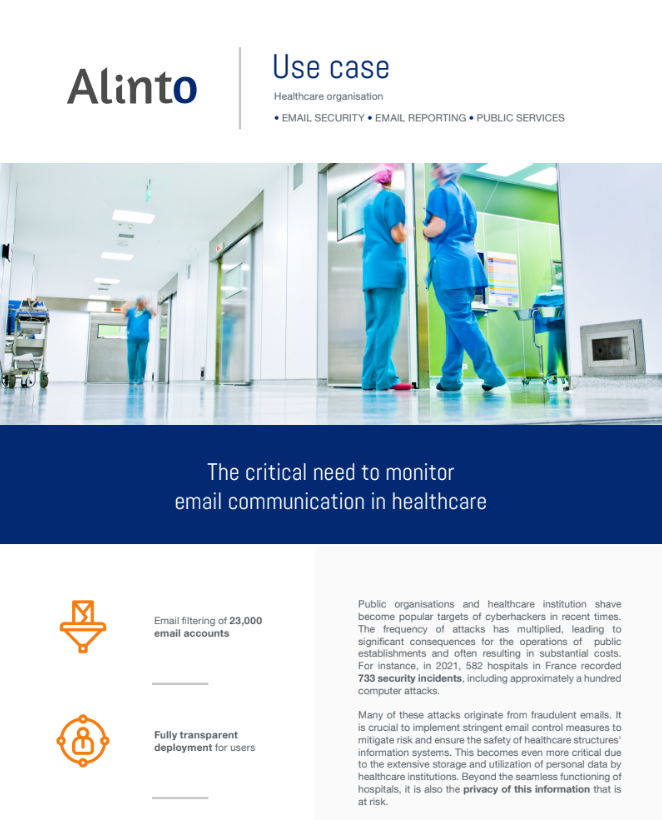
Why email protection is essential in healthcare
Public organisations and healthcare facilities have recently become popular targets for cyber hackers. The frequency of attacks has multiplied, which has a significant impact on the operations of public organisations and is often associated with significant costs.
Many of these attacks are the result of fraudulent emails. Not only is the smooth running of hospitals at risk, but also the confidentiality of data.
Estimating the cost of a cyber attack is difficult. Not only does it have an economic impact, but it can also damage an organisation's reputation, destabilise its IT infrastructure, and create operational challenges across multiple parts of the business.
Cyber attacks on healthcare organisations in Numbers
By 2020, 58% of cyber-attacks will have had a demonstrable impact on businesses, with 27% of cases resulting in a direct interruption to production.
The main impacts of the attacks are as follows
- Data theft (30%)
- Denial of service (29%)
- Business downtime due to data being encrypted by ransomware (24%)
- Identity theft (23%)
A study by Bessé shows that the risk of business failure increases by 50% in the three months following a cyber attack. In some cases, this risk can rise to 80%.
A study by the IBM Ponemon Institute found that 80% of French companies do not have an incident response plan in place. Furthermore, it takes an average of 201 days for a company to realise that it has been the victim of a cyber attack. The immediate impact can also be felt by customers when their personal data is stolen.
Hospital cyber attack examples
With regard to the security of healthcare facilities, here are a few examples of cyber attacks on hospitals (Numerama, December 2022, France)
- On 7 January, the Léonard de Vinci Clinic in Chambray-les-Tours was the victim of a ransomware attack in which the perpetrators demanded a ransom of 500,000 euros.
- The Cité Sanitaire in Saint-Nazaire was attacked on 12 January, leaving patients without television, internet and the ability to communicate with their families.
- A ransomware attack forced the suspension of radiology and oncology services at the Castelluccio hospital in Ajaccio on 28 March.
- Both Saint-Dizier and Vitry-le-François hospitals were hit by a ransomware attack on 19 April, with the perpetrators demanding a ransom of €1.2 million.
- On 27 May, the Centre Hospitalier de Mâcon was affected.
- On 20 August, the Centre Hospitalier de Corbeil-Essonnes was the victim of a ransomware attack for which Lockbit claimed responsibility and demanded a ransom of €1 million.
- Cahors Hospital suffered a cyber attack on 12 September.
- The Maternité des Bluets in Paris XIIIe was hit by ransomware on 9 October, with the Vice Society claiming responsibility for the attack.
A seemingly innocent click on a link in an email can put your entire business at risk. Strict management of business emails is therefore essential.
This healthcare customer case study is about
• Controlling the flow of email: a basic security measure for email in healthcare organisations.
• Improved security and tailored reporting.
• Effective anti-spam and simplified quarantine management.
• High-quality support valued by the IT team.

Free download: Your email address is not required
